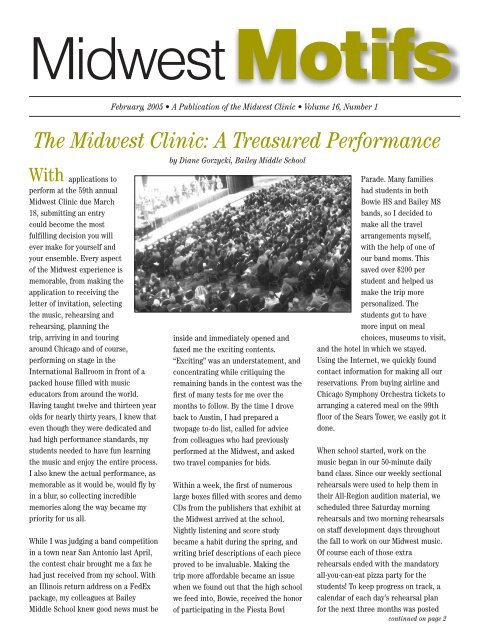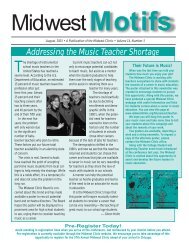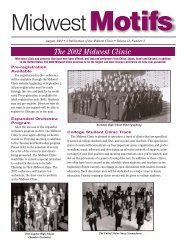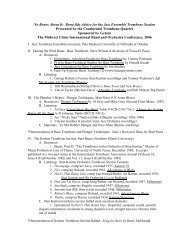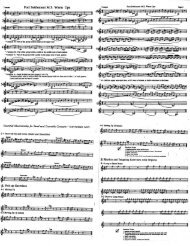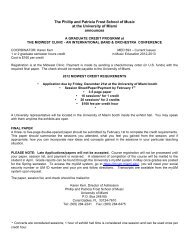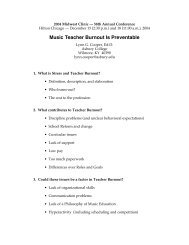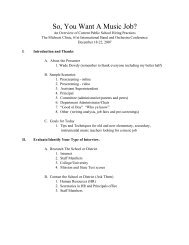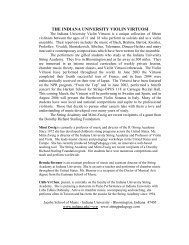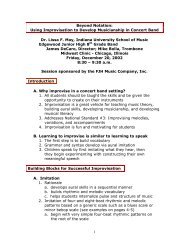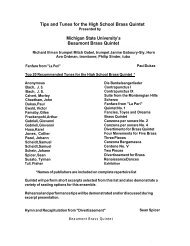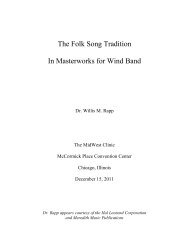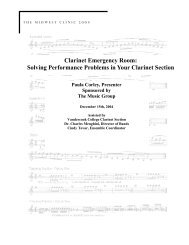February 2005 - The Midwest Clinic
February 2005 - The Midwest Clinic
February 2005 - The Midwest Clinic
Create successful ePaper yourself
Turn your PDF publications into a flip-book with our unique Google optimized e-Paper software.
<strong>Midwest</strong> Motifs<br />
applications to<br />
perform at the 59th annual<br />
<strong>Midwest</strong> <strong>Clinic</strong> due March<br />
18, submitting an entry<br />
could become the most<br />
fulfilling decision you will<br />
ever make for yourself and<br />
your ensemble. Every aspect<br />
of the <strong>Midwest</strong> experience is<br />
memorable, from making the<br />
application to receiving the<br />
letter of invitation, selecting<br />
the music, rehearsing and<br />
rehearsing, planning the<br />
trip, arriving in and touring<br />
around Chicago and of course,<br />
performing on stage in the<br />
International Ballroom in front of a<br />
packed house filled with music<br />
educators from around the world.<br />
Having taught twelve and thirteen year<br />
olds for nearly thirty years, I knew that<br />
even though they were dedicated and<br />
had high performance standards, my<br />
students needed to have fun learning<br />
the music and enjoy the entire process.<br />
I also knew the actual performance, as<br />
memorable as it would be, would fly by<br />
in a blur, so collecting incredible<br />
memories along the way became my<br />
priority for us all.<br />
While I was judging a band competition<br />
in a town near San Antonio last April,<br />
the contest chair brought me a fax he<br />
had just received from my school. With<br />
an Illinois return address on a FedEx<br />
package, my colleagues at Bailey<br />
Middle School knew good news must be<br />
<strong>February</strong>, <strong>2005</strong> • A Publication of the <strong>Midwest</strong> <strong>Clinic</strong> • Volume 16, Number 1<br />
<strong>The</strong> <strong>Midwest</strong> <strong>Clinic</strong>: A Treasured Performance<br />
With<br />
by Diane Gorzycki, Bailey Middle School<br />
inside and immediately opened and<br />
faxed me the exciting contents.<br />
“Exciting” was an understatement, and<br />
concentrating while critiquing the<br />
remaining bands in the contest was the<br />
first of many tests for me over the<br />
months to follow. By the time I drove<br />
back to Austin, I had prepared a<br />
twopage to-do list, called for advice<br />
from colleagues who had previously<br />
performed at the <strong>Midwest</strong>, and asked<br />
two travel companies for bids.<br />
Within a week, the first of numerous<br />
large boxes filled with scores and demo<br />
CDs from the publishers that exhibit at<br />
the <strong>Midwest</strong> arrived at the school.<br />
Nightly listening and score study<br />
became a habit during the spring, and<br />
writing brief descriptions of each piece<br />
proved to be invaluable. Making the<br />
trip more affordable became an issue<br />
when we found out that the high school<br />
we feed into, Bowie, received the honor<br />
of participating in the Fiesta Bowl<br />
Parade. Many families<br />
had students in both<br />
Bowie HS and Bailey MS<br />
bands, so I decided to<br />
make all the travel<br />
arrangements myself,<br />
with the help of one of<br />
our band moms. This<br />
saved over $200 per<br />
student and helped us<br />
make the trip more<br />
personalized. <strong>The</strong><br />
students got to have<br />
more input on meal<br />
choices, museums to visit,<br />
and the hotel in which we stayed.<br />
Using the Internet, we quickly found<br />
contact information for making all our<br />
reservations. From buying airline and<br />
Chicago Symphony Orchestra tickets to<br />
arranging a catered meal on the 99th<br />
floor of the Sears Tower, we easily got it<br />
done.<br />
When school started, work on the<br />
music began in our 50-minute daily<br />
band class. Since our weekly sectional<br />
rehearsals were used to help them in<br />
their All-Region audition material, we<br />
scheduled three Saturday morning<br />
rehearsals and two morning rehearsals<br />
on staff development days throughout<br />
the fall to work on our <strong>Midwest</strong> music.<br />
Of course each of those extra<br />
rehearsals ended with the mandatory<br />
all-you-can-eat pizza party for the<br />
students! To keep progress on track, a<br />
calendar of each day’s rehearsal plan<br />
for the next three months was posted<br />
continued on page 2
Bailey Middle School, Austin, Texas<br />
on the band office door. Until late<br />
November, the ensemble seldom<br />
rehearsed together, having the class<br />
broken into small groups with my two<br />
associates, Bill Haehnel and Scott<br />
Solkofske, teaching with me. Like<br />
weaving a tapestry, we made slow,<br />
methodical progress, with the music<br />
gradually unfolding and developing.<br />
By Thanksgiving break, we had taught<br />
all nine pieces and started to meet<br />
daily as an ensemble to achieve more<br />
refined balancing and to work for<br />
continuity and endurance, both mental<br />
and physical.<br />
<strong>The</strong>re was not one piece in our<br />
repertoire that the students didn’t love<br />
rehearsing. <strong>The</strong> selections became<br />
most memorable, however, as they met<br />
the composers and rehearsed with<br />
guest clinicians. We commissioned<br />
Randol Bass to write a piece based on<br />
Austin cyclist Lance Armstrong who<br />
had just won his sixth Tour de France.<br />
Mr. Bass composes primarily for<br />
professional orchestras, including the<br />
Chicago and Dallas Symphonies, so<br />
writing for a middle school band was a<br />
new experience. Guest clinicians<br />
included Eddie Green, retired Wind<br />
Ensemble director from the University<br />
of Houston, Paula Crider, University of<br />
Texas Professor Emerita, and John<br />
Benzer from the University of Houston.<br />
2<br />
<strong>The</strong>ir expertise helped strengthen the<br />
students’ ability to pull the music off<br />
the page.<br />
“Being invited to <strong>The</strong><br />
<strong>Midwest</strong> <strong>Clinic</strong> was<br />
amazing and working<br />
hard to get there is<br />
something I will be<br />
proud of and remember<br />
for the rest of my life.”<br />
—Marissa C., Student<br />
A counselor at our school who<br />
performed with her high school band at<br />
<strong>The</strong> <strong>Midwest</strong> <strong>Clinic</strong> told our students<br />
that they will never forget performing<br />
in Chicago. To help them keep their<br />
memories, all of their photos are being<br />
compiled on a CD that will be<br />
duplicated for everyone, and copies of<br />
congratulatory letters are being<br />
distributed for them to add to their<br />
portfolios. In reflecting about the<br />
experience, Marissa C., wrote “Being<br />
invited to <strong>The</strong> <strong>Midwest</strong> <strong>Clinic</strong> was<br />
amazing and working hard to get there<br />
is something I will be proud of and<br />
remember for the rest of my life.” She<br />
also stated that “the anticipation and<br />
excitement I felt in the last few<br />
minutes before the performance was<br />
something I have never experienced<br />
before, much less the feelings of<br />
accomplishment I had while<br />
performing on stage.” Megan R. wrote,<br />
“At first the stage was a very scary<br />
place, but on it, we got to enjoy<br />
expressing our talent and love of<br />
music. <strong>The</strong> trip itself was amazing, but<br />
the confidence and thrill during the<br />
concert was the best feeling.” Collin S.<br />
wrote, “I will never forget the applause<br />
of the audience at the end of the<br />
performance. In looking around the<br />
room between pieces, I could not<br />
believe that all those people came to<br />
hear us.”<br />
Seeing those students’ beaming faces<br />
during the applause following each<br />
selection affirmed that they understood<br />
the reason we worked so hard during<br />
the fall. <strong>The</strong> performance was over so<br />
quickly, but the memories of the entire<br />
experience will be a treasure we will<br />
all keep for a lifetime. ■<br />
Diane Gorzycki<br />
is Director of<br />
Bands at<br />
Bailey Middle<br />
School
<strong>The</strong><br />
<strong>Midwest</strong> <strong>Clinic</strong> is saddened to<br />
announce the passing of Victor W. Zajec<br />
on January 26, <strong>2005</strong>. Victor Zajec was a<br />
member of the Board of Directors since<br />
1983, serving as Secretary since 1992 and<br />
as Chairman of the Archives and History<br />
Committee since 1990. He was intimately<br />
associated with the <strong>Midwest</strong> <strong>Clinic</strong> from<br />
its very start in 1946, when he was the<br />
first chair clarinetist in the reading band<br />
that performed that day. In the following<br />
two years he retained his solo chair in the<br />
VanderCook Band for their clinic<br />
performances. In 1958, Zajec brought his<br />
high school band from Philadelphia,<br />
Mississippi, to perform at the clinic. He<br />
also directed the VanderCook Band on<br />
their <strong>Midwest</strong> concert each year from<br />
1963 through 1987, first as an associate<br />
director, and then as the conductor. All<br />
told, he appeared in more than fifty<br />
<strong>Midwest</strong> <strong>Clinic</strong> concerts during his long<br />
association with the organization.<br />
Victor Zajec retired in 1988 as Professor<br />
of Music at VanderCook College of Music<br />
in Chicago, having been on the faculty<br />
since 1963. In addition to serving as<br />
Director of the Symphonic Band and Dean<br />
of the Graduate School, he taught<br />
woodwind and brass instruments, music<br />
theory, instrument repair, marching band,<br />
and physics of sound.<br />
Prior to joining the VanderCook faculty,<br />
Zajec directed high school bands in<br />
Charleston and Philadelphia, Mississippi,<br />
for fifteen years. He held BMEd and<br />
MMEd degrees, and an honorary Doctor of<br />
Music degree from VanderCook College.<br />
Other education includes graduate studies<br />
at the University of Michigan, University<br />
of Houston, University of Southern<br />
Victor W. Zajec<br />
1923-<strong>2005</strong><br />
Mississippi, American University in<br />
Fountainbleau, France, and Roosevelt<br />
University in Chicago.<br />
Victor Zajec was a member of the Board<br />
of Trustees of VanderCook College and a<br />
member of the Board of Directors of the<br />
American Bandmasters Association,<br />
including a role as the treasurer of the<br />
ABA Foundation for many years. He was a<br />
member of Kappa Kappa Psi, Phi Beta<br />
Mu, and College Band Directors National<br />
Association. He also served the board of<br />
the Sousa Foundation as both vice<br />
president and treasurer and was active in<br />
the American School Band Directors<br />
Association.<br />
Victor Zajec receives the<br />
<strong>Midwest</strong> <strong>Clinic</strong> medal of Honor<br />
from John Paynter in 1990.<br />
Zajec received many honors during his<br />
teaching career, including “Teacher of the<br />
Year” from the Charleston Education<br />
Association, and a similar honor from the<br />
Philadelphia Education Association. He<br />
was also honored with lifetime<br />
membership in the Mississippi Music<br />
Educators Association. Kappa Kappa Psi<br />
also honored him with the “A. Frank<br />
Martin” award for outstanding<br />
bandmasters.<br />
<strong>The</strong> <strong>Midwest</strong> <strong>Clinic</strong> awarded him the<br />
Medal of Honor in 1990. In 1992 the<br />
Mississippi Bandmasters Association<br />
inducted him into the Phi Beta Mu “Hall<br />
of Fame.” <strong>The</strong> Xi Kappa Chapter of Phi<br />
Mu Alpha Sinfonia presented him with<br />
the “Orpheus Award” in 1993, the<br />
Chicagoland Music Educators presented<br />
him with the “John P. Paynter<br />
Lifetime Achievement Award,” in 1997,<br />
and in 1999 the John Philip Sousa<br />
Foundation awarded him its highest<br />
honor, the Sudler “Medal of Honor.” In<br />
2001 he was appointed Historian of the<br />
ABA and at the 2002 convention, Zajec<br />
was honored with their highest award—<br />
“ABA Honorary Lifetime Member.” Zajec’s<br />
most recent honor came in December<br />
2004, when he received the National Band<br />
Association’s prestigious Academy of Wind<br />
and Percussion Arts Award.<br />
Among the four books he authored was<br />
<strong>The</strong> First Fifty Years: A History of the<br />
Mid-West International Band and<br />
Orchestra <strong>Clinic</strong>. Since the publication of<br />
this history book in 1996, he was no less<br />
diligent in preserving and archiving the<br />
most recent history of the <strong>Midwest</strong> <strong>Clinic</strong>.<br />
At the same time, he was a powerful<br />
advocate for music education, speaking<br />
up to ensure that the <strong>Midwest</strong> <strong>Clinic</strong><br />
continues to meet the needs of teachers<br />
everywhere. His talents and good works<br />
live on in the lives of the thousands<br />
of students who benefited from his<br />
teaching. ■<br />
3
“Poise Under Pressure...and<br />
the Rest of the Story”<br />
by Dennis Montgomery<br />
On<br />
Tuesday, December<br />
14, the first day of the 2004<br />
<strong>Midwest</strong> <strong>Clinic</strong>, a chamber<br />
orchestra from Louisville,<br />
Kentucky performed in the<br />
Grand Ballroom of the Hilton<br />
Chicago. Taken at face value,<br />
it was a memorable and<br />
moving performance—very<br />
musical, sensitive, and<br />
beautifully played. But there<br />
is much more to this story:<br />
these students performed<br />
without a director, and until 1:00 p.m.<br />
the previous day, they did not know<br />
that this was to be their fate.<br />
Bad News<br />
Six days before the <strong>Midwest</strong> <strong>Clinic</strong>,<br />
Lyndon Lawless, conductor of the<br />
Youth Performing Arts School Chamber<br />
Orchestra of Louisville, experienced<br />
serious dizzy spells, which caused him<br />
to call his physician. To determine the<br />
nature of his condition, it was arranged<br />
for him to wear a heart monitor for the<br />
weekend. On Monday, the news was not<br />
good. At 10:00 a.m., Lyndon was told<br />
that his condition required him to<br />
consult a cardiologist immediately.<br />
Under no circumstances was he to<br />
travel to Chicago that afternoon!<br />
Five Hours to Create<br />
an Alternate Plan<br />
Lawless now had five hours, which<br />
included a rehearsal, before his<br />
chamber orchestra was to leave for<br />
Chicago. First, he approached the<br />
4<br />
school administration to see if they<br />
would allow the group to go to Chicago<br />
without him. <strong>The</strong>y said yes. He then<br />
called the <strong>Midwest</strong> <strong>Clinic</strong> office to see<br />
if his students could be allowed to<br />
perform without a conductor. Lyndon<br />
says that Executive Administrator Kelly<br />
Jocius was extremely gracious about<br />
the unique circumstances. <strong>The</strong> 0rchestra<br />
would be allowed to perform without a<br />
conductor so that the students would<br />
not miss the opportunity for which they<br />
had so long been preparing. With a<br />
plan for success forming, Lawless’ wife<br />
had to be called next so that she could<br />
be apprised of the situation. She had<br />
already driven halfway to Chicago and<br />
would have to turn around and come<br />
home. <strong>The</strong> last call was to enlist the<br />
aid of Mrs. Thompson, a parent<br />
chaperone, who now would be the<br />
recipient of all of the information<br />
regarding the arrangements for the<br />
trip—information still in Lawless’<br />
head.<br />
Telling the<br />
Students<br />
At 1:00 p.m.—four hours<br />
before departure—at the<br />
final pre-clinic rehearsal,<br />
Lawless told the orchestra<br />
that he could not go to<br />
Chicago. One student’s<br />
reaction was, “You’re<br />
kidding!” It was very quiet in<br />
the room. “You can still go,”<br />
he told them. He explained<br />
that they needed to choose a<br />
leader and that they must listen to this<br />
person and let him/her handle on-stage<br />
activities and make the tough musical<br />
decisions needed on the trip. Lawless<br />
encouraged them: “I think you can do<br />
it. What do you think” Immediately<br />
some students said no. Others said yes.<br />
After much discussion, all of the
discussion, all of the students felt<br />
confident that they COULD do this!<br />
With many details still to manage,<br />
Lawless left the students to finish the<br />
final rehearsal by themselves.<br />
Periodically he checked on their<br />
progress. At one point when he walked<br />
in, they were not playing but instead<br />
were discussing how to meet this<br />
challenge. Two students emerged as<br />
the group’s choice for co-leaders, Luke<br />
Davidson and Alice Culin-Ellison. Mr.<br />
Lawless’ final words of encouragement<br />
were, “This will be a wonderful<br />
challenge.”<br />
On Stage at <strong>Midwest</strong><br />
In the past, <strong>Midwest</strong> <strong>Clinic</strong> staff<br />
members have seen even the most<br />
experienced organizations feel the<br />
pressure and anxiety of performing for<br />
such a large and knowledgeable<br />
audience. Early Tuesday morning, the<br />
conference staff was told that the<br />
conductor of the Youth Performing Arts<br />
School Chamber Orchestra was still in<br />
Kentucky. Could these students handle<br />
not only the customary tension of a<br />
<strong>Midwest</strong> performance but also a<br />
performance without their conductor<br />
<strong>The</strong> ensemble moved into the<br />
performance area seemingly unruffled.<br />
Back stage I shared a glance with<br />
Dorothy Straub, the <strong>Midwest</strong> <strong>Clinic</strong><br />
board member who was hosting this<br />
concert. Even if the students weren’t<br />
nervous, we were! It was soon evident<br />
that the students themselves were<br />
totally in charge of this group,<br />
musically. <strong>The</strong>re was no chaos, no<br />
arguments about who would do what.<br />
Starting, ending, tuning and tempo<br />
adjustments during the performance<br />
were handled by the two chosen<br />
student leaders. Ms. Straub<br />
remembers, “<strong>The</strong> two young people<br />
who took the initiative to lead the<br />
group did so quite subtly but very<br />
effectively.”<br />
Dorothy Straub greets members of<br />
the Youth Performing School<br />
Chamber Orchestra.<br />
Just prior to the performance, all of<br />
the students, in a very serious manner,<br />
approached Ms. Straub and asked if<br />
she would announce to the audience,<br />
on their behalf, that they wanted to<br />
dedicate this performance to their<br />
director, Lyndon Lawless. Straub notes,<br />
“<strong>The</strong> maturity and calmness of the<br />
students was remarkable. Not a single<br />
musician seemed at all distracted by<br />
the fact that their teacher was ill and<br />
they would perform without him. Also,<br />
it impressed me that there were no<br />
egos in the orchestra.” After Straub<br />
introduced the group, the students<br />
took the stage to thunderous applause<br />
from a very large and empathetic<br />
audience—and went to work.<br />
Performing with<br />
Passion<br />
<strong>The</strong>ir first selection was Suite No.3 in<br />
D, second movement, by J.S. Bach.<br />
Beautiful, sonorous, glorious sounds<br />
emanated from the Grand Ballroom<br />
stage. This set the tone for the entire<br />
performance. <strong>The</strong>se students knew<br />
what they were doing. <strong>The</strong> concert<br />
finale was the third movement from<br />
Divertimento by Bela Bartok. Once<br />
again, the performance was<br />
beautiful—no ragged entrances, no<br />
pitch problems, no lack of musical<br />
feeling. Backstage I found myself just<br />
enjoying the music, forgetting that they<br />
were high school students or that their<br />
conductor was still in Kentucky.<br />
Perhaps their calm came from wanting<br />
so badly to do well to honor their<br />
director. Perhaps it was a result of<br />
performing so often in front of other<br />
prestigious audiences. Or perhaps their<br />
calm stemmed from their teacher<br />
having trained them to work<br />
independently of a conductor so that<br />
“poise under pressure” came naturally.<br />
Long after the performance, when I<br />
interviewed him, Lawless shared with<br />
me that he often told his students, “If<br />
you perform the music with unified<br />
passion and reasonable accuracy,<br />
listeners can’t help but respond.”<br />
And the audience responded indeed,<br />
with enthusiastic applause for this<br />
wonderful musical presentation and for<br />
the students’ ability to “go on” under<br />
difficult circumstances. Each director<br />
present must have wondered if his or<br />
her students, under those conditions...<br />
under those pressures... could do the<br />
same. ■<br />
Dennis<br />
Montgomery is<br />
a private brass<br />
instructor,<br />
General<br />
Manager of the<br />
Northshore Concert Band, and<br />
Stage Manager at the <strong>Midwest</strong><br />
<strong>Clinic</strong>.<br />
5
<strong>Midwest</strong> <strong>Clinic</strong> Attendees Welcomed<br />
at Orchestra Hall<br />
<strong>The</strong> following speech was given by Gene Pokorny during the December 16, 2004<br />
Chicago Symphony Orchestra subscription concert at Orchestra Hall. He was asked by the<br />
CSO Artistic Department to give a greeting to the <strong>Midwest</strong> <strong>Clinic</strong> attendees who were present at the concert.<br />
Good<br />
evening ladies and<br />
gentlemen. My name is Gene. I am the<br />
tuba player in the orchestra. I want to<br />
extend a very cordial and warm<br />
welcome to all of you this evening, not<br />
only to our loyal and faithful<br />
subscribers, but to those who may be<br />
here for the first time. I would also like<br />
to welcome those here who are<br />
attending the <strong>Midwest</strong> <strong>Clinic</strong>.<br />
Annually, this convention brings<br />
together everyone connected with<br />
music education as well as various<br />
musical organizations from junior high<br />
orchestras to community bands, from<br />
high school level organizations to the<br />
super-powered service bands of our<br />
nation’s capital. <strong>The</strong> vast majority of<br />
those in attendance at this convention<br />
are music educators. It is that band<br />
director who is sitting with you up in<br />
the gallery tonight who is taking your<br />
kids and grandkids away from a<br />
computer terminal for one hour a day<br />
so they can learn the art of teamwork<br />
without having to type that word into<br />
Google. This band director doesn’t do<br />
it with a mere 8 or 11 people on a team<br />
like the P.E. coaches do; he teaches<br />
teamwork with 50 or 60 or 100-plus<br />
players. <strong>The</strong>re is also the school<br />
orchestra conductor who is now sitting<br />
with you in the terrace who goes well<br />
beyond the mandate by the board of<br />
education to teach reading and writing.<br />
She is teaching the art of listening—a<br />
class that is never offered in school,<br />
but that is the subject this orchestra<br />
conductor teaches to her students from<br />
the first day of class in September.<br />
While professional orchestras attempt<br />
to figure out how to fill the seats in<br />
their concert halls, it’s that director of<br />
the marching band at the back of the<br />
main floor here tonight who programs<br />
great music like the finale to the<br />
“Firebird Suite” or “Pictures at an<br />
Exhibition” for his school’s Friday night<br />
football games. His band members will<br />
get to know that music and they will<br />
remember it. It might just be enough<br />
for them to seek it out later in life in a<br />
concert at Orchestra Hall. And they<br />
might eventually pass that good<br />
experience down to their kids as well.<br />
Nothing can transport you to a place or<br />
a memory as fast as a piece of music.<br />
When the rubber meets the pavement,<br />
it is the music educators in our world<br />
who day-in, day-out, make a big<br />
difference with relatively little<br />
recognition. Somebody once described<br />
that being a band director is the same<br />
as being someone who runs a cemetery.<br />
<strong>The</strong>re are a lot of people underneath<br />
you, but no one is listening. I disagree<br />
with that statement because a lot of<br />
people eventually do listen. For<br />
example, the people on this stage<br />
behind me, I guarantee you, eventually<br />
listened to their music teachers. <strong>The</strong><br />
music educators who are present here<br />
tonight are teaching their students<br />
probably the most valuable lesson of<br />
all: that it is good to have an<br />
enthusiasm and love for music so great<br />
that one will make an extraordinary<br />
effort in one of the busiest weeks of the<br />
year to hear a live performance by one<br />
of the world’s great orchestras.<br />
Teaching by example is the most<br />
convincing lesson of all. For the music<br />
educators in the hall tonight, thank you<br />
for coming. You are among the greatest<br />
friends this orchestra can have. And<br />
thank all of you, ladies and gentlemen,<br />
for bringing yourselves, your kids, and<br />
your friends to this very special place,<br />
exactly three days older than 100 years<br />
old now. Feel welcome here because<br />
you most certainly are. Enjoy the<br />
evening. ■<br />
Gene Pokorny<br />
is the Principal<br />
Tuba of the<br />
Chicago<br />
Symphony<br />
Orchestra.<br />
6
Act Now! Don’t Miss these Opportunities<br />
at the <strong>Midwest</strong> <strong>Clinic</strong> Website<br />
<strong>The</strong> 2004 <strong>Midwest</strong> <strong>Clinic</strong> may be over and the <strong>2005</strong> <strong>Midwest</strong> <strong>Clinic</strong> may still be 300 days away,<br />
but there are plenty of opportunities for you to take part in several educational<br />
resources available to you throughout the coming months.<br />
Attendee Web Survey<br />
You are invited to complete the <strong>Midwest</strong> <strong>Clinic</strong>’s annual<br />
survey, now available at our website. This survey includes<br />
questions about clinics and concerts and many other<br />
issues affecting the conference. It is your best<br />
opportunity to tell us whatever is on your mind and how<br />
we can better serve you. Responses to last year’s survey<br />
directly affected decisions about the 2004 and future<br />
<strong>Midwest</strong> <strong>Clinic</strong>s, including what kinds of clinics to<br />
program, how to address space limitations at the Hilton,<br />
and when to schedule our 60th anniversary conference in<br />
2006. It will only take a few minutes to complete your<br />
survey, and your response WILL make an impact on what<br />
is offered at the <strong>Midwest</strong> <strong>Clinic</strong>!<br />
Attendee Survey: http://www.midwestclinic.org/survey/<br />
2004 Concert Selection<br />
Streaming Videos<br />
You can relive the 2004 <strong>Midwest</strong> <strong>Clinic</strong> at any time this<br />
year by watching streaming video concert selections<br />
through our website. Included in this archive are 75<br />
selections from 27 ensembles that performed at the 2004<br />
<strong>Midwest</strong> <strong>Clinic</strong>. <strong>The</strong>se TV-quality videos are available for<br />
viewing throughout <strong>2005</strong>.<br />
Performance<br />
Performance applications can be printed from the<br />
<strong>Midwest</strong> <strong>Clinic</strong> website. Also available are answers<br />
to Frequently Asked Questions about performance<br />
applications and our Performance Application<br />
Recording Tips.<br />
Performance Application:<br />
http://www.midwestclinic.org/perfapp.pdf<br />
FAQs: http://www.midwestclinic.org/performancefaqs.asp<br />
Recording Tips:<br />
http://www.midwestclinic.org/recording101/<br />
Band Archive:<br />
http://www.midwestclinic.org/band_archive.asp<br />
Orchestra Archive:<br />
http://www.midwestclinic.org/orchestra_archive.asp<br />
Jazz Archive:<br />
http://www.midwestclinic.org/jazz_archive.asp<br />
Small Ensemble Archive:<br />
http://www.midwestclinic.org/smallensemble_archive.asp<br />
Handouts Available<br />
Through our website, you can download and print clinic<br />
handouts from the last five <strong>Midwest</strong> <strong>Clinic</strong>s (2000-2004).<br />
Handouts from more than 100 clinics are available. <strong>The</strong><br />
<strong>Midwest</strong> <strong>Clinic</strong> gratefully acknowledges all of these<br />
clinicians for giving permission for their handouts to be<br />
posted.<br />
http://www.midwestclinic.org/clinichandouts.asp<br />
Concert CDs and DVDs For<br />
Sale<br />
CDs and DVDs of <strong>Midwest</strong> <strong>Clinic</strong> concerts from the last<br />
four years (2001-2004) can be purchased from Mark<br />
Custom Recording Services, Inc. through the <strong>Midwest</strong><br />
<strong>Clinic</strong> website.<br />
http://www.midwestclinic.org/store/default.asp<br />
Appear at the <strong>2005</strong> <strong>Midwest</strong> <strong>Clinic</strong><br />
<strong>Clinic</strong><br />
<strong>Clinic</strong> proposal forms can also be printed from the<br />
website. To aid applicants, we have created an<br />
instruction video about how to prepare an effective<br />
clinic proposal.<br />
<strong>Clinic</strong> Proposal Form:<br />
http://www.midwestclinic.org/clinicapp.pdf<br />
Instruction Video:<br />
http://www.midwestclinic.org/clinicianappvideo.asp.<br />
All applications must be received in the <strong>Midwest</strong> <strong>Clinic</strong> office by 5:00 p.m. CST on Friday, March 18.<br />
Please do not delay in preparing your applications. This deadline cannot be extended.<br />
www.midwestclinic.org<br />
7
828 Davis Street, Suite 100<br />
Evanston, Illinois 60201-4423<br />
Presorted Non-Profit<br />
U.S. Postage<br />
PAID<br />
Evanston, IL 60201<br />
Permit No. 170<br />
59th Annual <strong>Midwest</strong> <strong>Clinic</strong>—December 13-17, Hilton Chicago<br />
Scenes from the 2004 <strong>Midwest</strong> <strong>Clinic</strong><br />
OFFICERS AND BOARD<br />
OF DIRECTORS<br />
Ray E. Cramer, President<br />
Richard C. Crain, Vice-President<br />
Mark S. Kelly, Vice-President<br />
Glenn E. Holtz, Treasurer<br />
Harry Begian<br />
Richard E. Brittain<br />
John Clinton<br />
Jacquelyn Dillon-Krass<br />
Rodney Dorsey<br />
J. Richard Dunscomb<br />
Antonio J. García<br />
Mark Kjos<br />
Ed Lisk<br />
David C. McCormick<br />
Denny Senseney<br />
Dorothy Straub<br />
John Whitwell<br />
BOARD MEMBERS EMERITUS<br />
Eugene W. Allen<br />
Neil A. Kjos, Jr.<br />
Dorothy Kunkel<br />
Marvin J. Rabin<br />
EXECUTIVE ADMINISTRATOR<br />
Kelly S. Jocius<br />
EXECUTIVE ASSISTANT<br />
Darcy A. Nendza<br />
ADMINISTRATIVE OFFICE<br />
828 Davis Street, Suite 100<br />
Evanston, IL 60201-4423<br />
(847) 424-4163<br />
FAX (847) 424-5185<br />
info@midwestclinic.org<br />
http://www.midwestclinic.org


